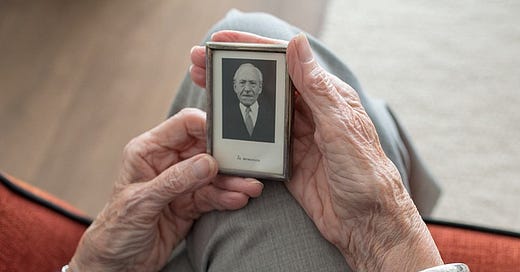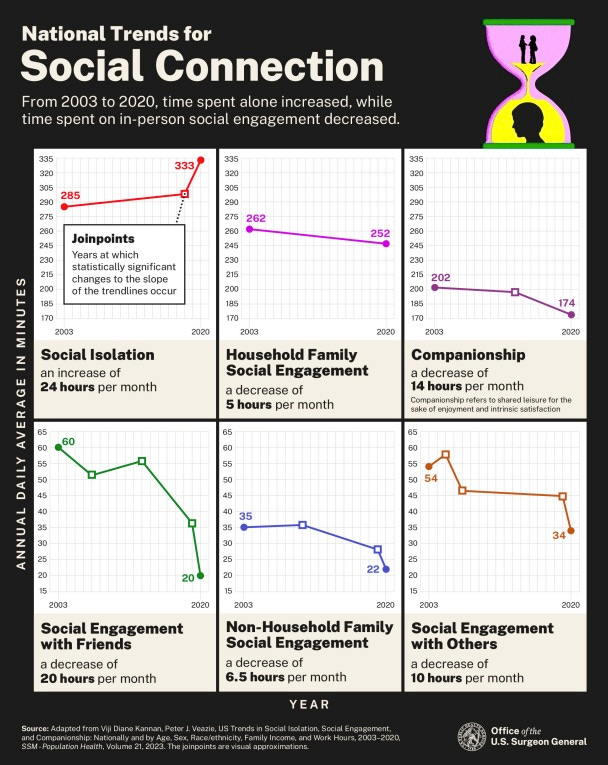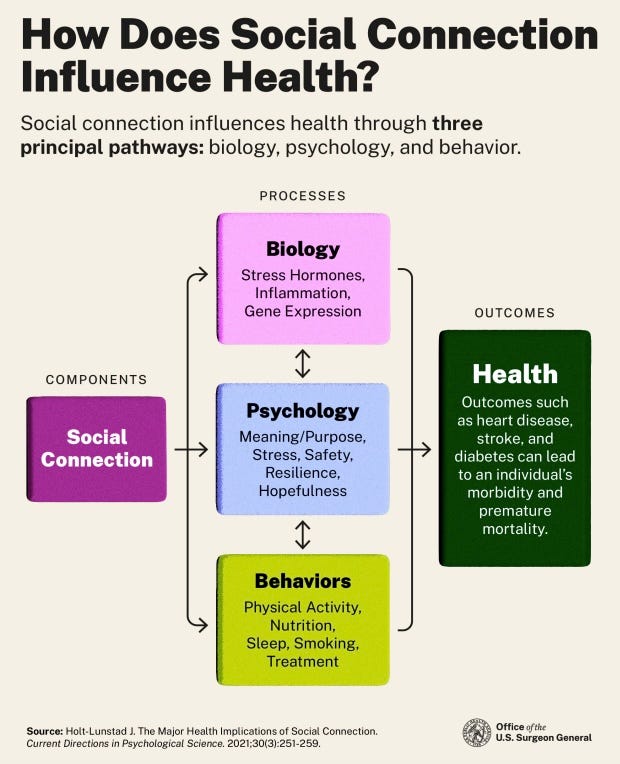Elder Orphans: Challenges
No matter what happens as you grow older, you need to have others’ support to live with meaning and purpose. Otherwise, loneliness sets in.
Image by Sabine van Erp from Pixabay
When I was a youngster, my mother would drag me around with her to visit the sick and elderly in our small town. I hated these excursions. The old folks frequently smelled bad. They couldn’t hear very well. Their conversation was boring.
But despite my objections, my mother persisted. She took visiting “shut-ins” very seriously, “Come along. It will be good for you.” Even when I was in college, I remained unconvinced, although by then I should have understood and appreciated what she was doing.
Years later, however, when my parents were living in a retirement community in Florida, I came to understand my mother’s dedication to helping the elderly. They lived in a housing development on the Peace River in Punta Gorda (later destroyed by a hurricane) where several retired teachers and others from their home region of Central Indiana resided. They and their friends lived independently in comfortable, double-wide mobile homes and enjoyed a lively social existence with one another. They supported each other.
To my shameful surprise, I found these folks really interesting to talk with. At the age of 45(!), I finally got the point. No matter what happens as you grow older, you need to have others’ support to live with meaning and purpose. Otherwise, loneliness will set in. Giving others that support is the least you can do while you hope for reciprocity.
The Loneliness Epidemic
A vast array of social science reports that Americans of all ages suffer from a loneliness epidemic. Indeed, this has been widely reported by major news media. For fairly obvious reasons, older persons have typically reported feeling lonely more than younger people have. But that seems to be changing: now teenagers and young adults report feeling lonely more often than their elders, and that trend is growing.
Before going further, I must note an important distinction: social isolation is not identical to loneliness. “Social isolation” is, objectively, being by yourself for a short or extended period of time. “Loneliness” is subjectively feeling that being isolated is bad.
Several studies show that more people of all ages experience social isolation. Teenagers “hang out” with peers in person much less frequently than they did in previous years. People are waiting to marry (if they do marry at all) until later in life. And the number of persons living by themselves has been growing for some time.
While many people value their “alone time” positively and recognize it as necessary for their physical and mental health, being socially isolated continually and over long periods of time is unhealthy. The U.S. Surgeon General reports that extended isolation correlates with increased risk of chronic illness such as diabetes, obesity, cardiovascular disease, etc.[1]
Extended isolation also exacerbates mental health issues such as depression, anxiety, bipolar disorder, etc. Feelings of loneliness increase with extended isolation.
In fact, the number of persons who report having close friends upon whom they can rely for emotion and even financial support is declining. Lack of close friends or family as a support network correlates strongly with attempted suicide or suicidal ideation.
Alarmingly, increasing social isolation and accompanying feelings of loneliness have become a prominent public health issue as explained in the recent Surgeon General’s Advisory.
Elder Orphans
Elder orphans are persons who live alone with little or no support from family, friends, or others. Several factors can lead to this situation: prior death of parents or other senior family members, never married with no children, death of a spouse or life partner, divorce, estrangement, or geographical distance from children.
Even a married or cohabiting couple could qualify as elder orphans, especially if they have no meaningful support community of family, friends, or acquaintances.
Often, people in these circumstances have few financial resources. Social Security or disability payments (as small as they are) might be their only source of income. As housing, food, and medical costs rise, elder orphans can face dire challenges when trying to maintain themselves.
As the population of elderly individuals living into their 80s and beyond grows, the number of elder orphans will continue to increase. For example, persons 65-74 increased from 21.7 million in 2010 to 33.1 million in 2020 – a jump of 52.5%. This group of Boomers is now aging into their 80s, bringing their challenges along with them.[1]
Understandably, we might think of elder orphans as persons who have gradually lost parents, older family members, and children to death or separation. That is probably true for most. Nevertheless, there is another group who might be overlooked: those persons who never benefitted from any normal family support. They might have suffered severe abuse as children, or they might have been separated from their biological family at a very young age. For whatever reason, they might never marry or have children, thereby, through no fault of their own, joining the ranks of other elder orphans without family as a source of support and companionship.
Oddly, I qualify as an elder orphan despite being married. All the senior members of my family and my wife’s family are deceased. Other family members live far away and have no financial resources to help us in case of need. We have no children. Due to my age and the changing landscape in academia, I’ve also been unable to find regular employment in my field. While my spouse is employed (thankfully!) she remains vulnerable due to her chronic illness and particular skillset. Financial reverses during the recession of 2008 left me with no retirement funds other than Social Security. You’ll recall from an earlier post, Beyond Gluten-Free, that for health reasons, our restricted lifestyle impedes our ability to socialize regularly with friends.
Challenges Facing Elder Orphans
Individuals who exhibit the characteristics of my definition of elder orphan must cope with several overlapping situations:
Food acquisition and preparation – As we get older, what we eat becomes ever more important to maintain good health. When we were 19, our bodies didn’t care what we fed them. But that freedom comes to an end by the time we reach our 30s or 40s. If we ignore that, we will face significant, negative consequences. We all know that, but many of us fail to act on that knowledge.
Unfortunately, our standard food supply is crammed with ultra-processed foods, preservatives, and other unhealthy ingredients. Elderly persons often face extreme difficulty in finding, affording, and preparing fresh, healthy food at the very time they most need it. Programs like Meals On Wheels and food pantries are not set up to meet such needs. Empty promises to “lower the price of eggs” are, frankly, insulting in their lack of seriousness.Housing – America’s housing shortage is widely reported. Couples who can afford to purchase a single-family home confront waiting lines even to see available properties. Rising mortgage rates and prices have closed the market to many. Rental fees are now exorbitant and climbing rapidly. The supply of affordable housing for seniors with limited financial resources is woefully inadequate. No meaningful, government-supported plans exist to deal with this situation.
Health care and medications – Elderly persons generally have access to health care through Medicare and, sometimes, Medicaid. But financial and coverage gaps remain. For example, many coverage areas for serious illness, surgery, or hospitalization require individuals to pay 20% of the cost. Considering the high cost of many procedures and medication, that out-of-pocket share is beyond the ability of many to pay. Payments by Medicare or Medicaid for residents in nursing homes or skilled care facilities can vary markedly by state and generally are tied to specific income and resource requirements.
Further, Medicare does not cover dental, hearing, or visual expenses, precisely at a time when people most need such coverage. Some privatized Medicare Advantage (MA) plans provide limited coverage for these areas, but otherwise, MA plans are a colossal rip-off since they increase their profit by denying coverage for significant medical procedures and illnesses. (This is well documented and will be discussed in a later post.)
As elderly persons encounter more chronic illnesses, simply providing the needed self-care and maintaining a schedule of medication can be beyond their capability. Without visiting nurse or other in-home care arrangements, elder orphans might be deprived of life-sustaining care.Transportation – Simply getting from one place to another is no longer simple for elderly persons. Owning and maintaining a vehicle might be too expensive. Except in large urban areas, public transit is inadequate (New York City, in my experience, is the sole exception). And yet, it is somehow necessary to travel to the grocery store, the physician’s office, and other places just to get through life. To be sure, Amazon and other vendors deliver food products, but what is available for them to select and deliver does not meet the nutritional needs of aging individuals. In truth, we still live in a car-centered society (especially in rural and suburban areas) that makes transportation for the elderly a continuing, daily hassle.
And I haven’t even mentioned the difficulty of transporting oneself from the bed to the bathroom at night or up and down stairs!Loss of family and friends – This challenge is personal and eventually affects everyone. In addition to nearly all my family, most of my former professors and mentors are gone. Many of my former colleagues, with whom I became quite close, are gone. When I receive my college’s alumni magazine, I first turn to the obituaries to see which college buddies are no longer with us. Soberingly, even former students have begun to show up in these lists.
When people who have significantly influenced our lives die, we lose their companionship, empathy, and support. The witnesses to our lives are no longer available to correct our faulty memory or recall the funny or sad stories that make up the fabric of our identity.
Holidays and birthdays become especially difficult. I still have Christmas ornaments that belonged to my parents and that I remember from childhood. Mother’s Day and Father’s Day have become occasions for surreptitious mourning. Increasingly, such losses are harbingers of the loss of our own selves. The commercialized, faux-happiness of such holidays simply rubs salt into the wound of loss.Depression and lack of purpose – Depression can arise from many different causes. Clinicians now know, for example, that improper nutrition can create depression and that changes in what we eat can help mitigate it. Depression can also accompany various chronic diseases. This area deserves much more attention.
For elder orphans, retirement from employment or other obligations often results in a sense of anomie, of “what now?” Suddenly, we have no professional status, no recognized position in society, no socially useful purpose. Our day has no structure. No one really cares whether we live or die. If we’re isolated (for whatever reason) from family or friends, would anyone even know? That’s a pretty strong sense of being alone, of loneliness.
At first glance, reflecting on the experience of elder orphans and the challenges that they face seems overwhelming. We must remember, however, that their challenges are often the same challenges, although somewhat stronger, that everyone encounters as they age. In the next post, I’ll examine some things that individuals and society can do to help.
Public Policy Note
Although our tattered social safety net provides some support for senior citizens, the rising degree of social isolation and loneliness shows that it’s not enough.
Further, the announced plans of the Trump administration and Republicans in Congress to slash social programs such as Medicare, Medicaid, Social Security, SNAP, and others to provide funding for tax cuts for the very wealthy will increase suffering for the poor, senior citizens, and elder orphans in particular. In a wealthy society such as ours, such cuts in social services should be strongly resisted.
Main Takeaways
Elder orphans are senior individuals who are socially isolated for various reasons from family and close friends.
The fact of such social isolation contributes to the epidemic of loneliness in the U.S.
Social isolation and loneliness, together, lead to important challenges to physical and emotional well-being for elderly persons. Understanding these challenges is the first step toward helping everyone cope more effectively as they age.
Whether you’re an elder orphan or you know someone who is/has been, I’d be interested in learning about your story.
For younger folks, how do you plan to avoid or cope with these issues as you grow older?
NOTES
[1] United Census Bureau, “U.S. Older Population Grew From 2010 to 2020 at Fastest Rate Since 1880 to 1890, https://www.census.gov/library/stories/2023/05/2020-census-united-states-older-population-grew.html.
[1] U.S. Surgeon General, “Our Epidemic of Loneliness and Isolation: The U.S. Surgeon General’s Advisory on the Healing Effects of Social Connection and Community,” 2023, https://www.hhs.gov/sites/default/files/surgeon-general-social-connection-advisory.pdf.






